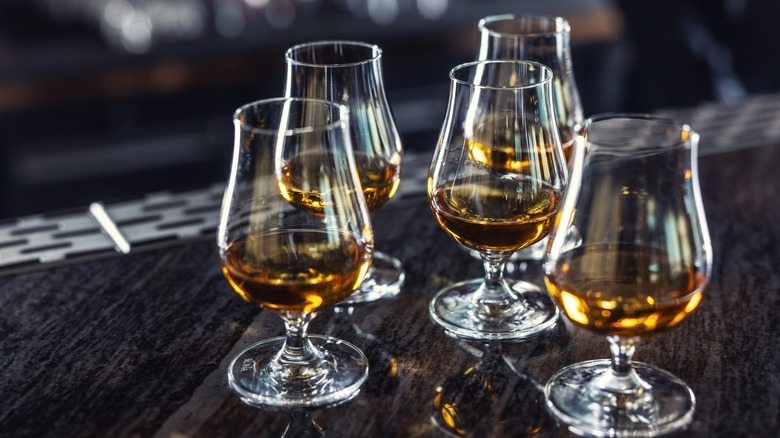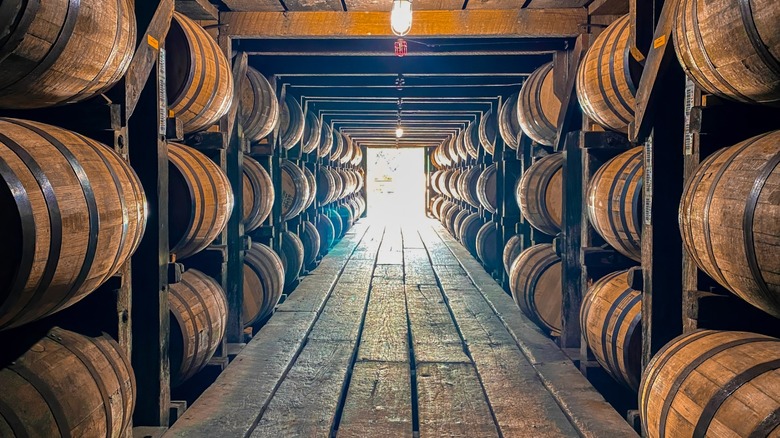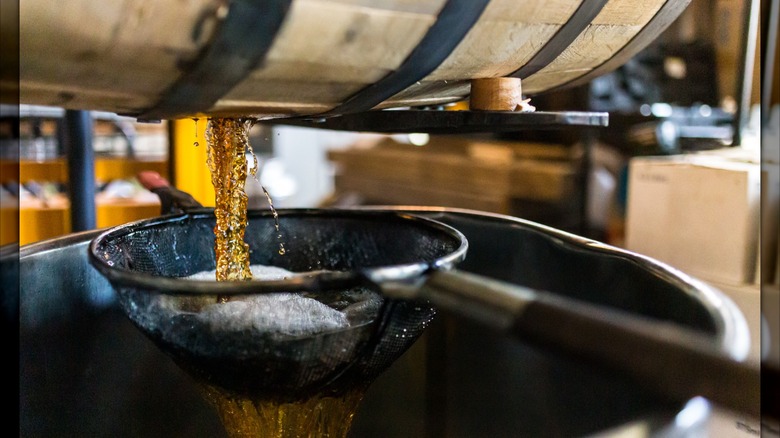Whiskey Vs Whisky: What's The Difference?
On the one hand, whiskey is quite simple. Just some water, a few choice grains, barrels, and a generous helping of patient waiting. On the other hand, though, the world of whiskey is about as technical and complex as you can imagine, with a slew of unique terms for you to learn as well as some faux pas for you to avoid – such as calling a whiskey "smooth." Indeed, it seems that even the name of the liquor itself can't be agreed upon, with two schools of thought emerging with different spellings of it. You'll see some whiskeys spelled with an "ey" at the end, while others drop the "e" entirely. So, which is the right way to spell it? Are these indicators of larger differences between the two?
Luckily, the differences between whiskey and whisky can largely be chalked up to regional differences owing to whisk(e)y's roots. The term whisk(e)y derives from the Gaelic word "uisce," from the term "uisce beatha," or "water of life" (a similar evolution to "eau de vie" or "aqua vitae" for their respective liquors). However, the Scottish and Irish versions of this word developed somewhat separately from each other, giving you the two versions of the same word that you have today. Nowadays, some regions carry the Scottish tradition and spell it "whisky" (plural "whiskies"), while others carry the Irish tradition and spell it "whiskey" (plural "whiskeys").
Whiskey covers the American liquor, too
As whisk(e)y production branched out from Scotland and Ireland to other parts of the world, different regions adopted the spelling associated with the predominant culture of the time. This means that, in the United States, whiskey is almost always spelled with the "e" fully intact. Many American whiskeys, then, including bourbon (a distinctive type of whiskey), rye, and Tennessee whiskey all feature the Irish iteration of the word. So even though a whiskey such as bourbon would be made from ingredients pretty distinct from Irish whiskeys, it'll still be spelled the same way.
The prevalence of Irish and American whiskey, especially when you're stateside, makes it so that a lot of the brands you encounter, including many bang-for-your-buck bourbons, will have this spelling variation on their labels. From an award-winning rye to a quintessentially Irish offering to a simple bottle of Jack Daniel's, there are plenty of examples of "whiskey" to be found at your local liquor store –- but it's not the only spelling you'll see.
Whisky has a broad range
While "whiskey" tends to be centered around Ireland and the United States, the Scottish spelling of the word has a much broader reach, encompassing Scottish (naturally), Canadian, and Japanese spirits predominantly. Some of these are household whisky names such as Johnnie Walker, Crown Royal, and Suntory, while others –- such as some rare, old single malt Scotches -– are dearly expensive whiskies to be collected by connoisseurs and serious enthusiasts.
One interesting thing about "whisky" is that it's not only subject to the Scottish spelling due to geographical influence and history (such as with Canadian whisky), but it can also be applied to a whisky that is stylistically inspired by Scotch. This is the reason as to why Japanese whiskies use this version of the word — their whisky is inspired by Scotch, and even their first attempts at whisky production were done with the help of some Scottish institutions. Interestingly enough, even some American-made versions of the spirit, such as Beyoncé's line of whisky, is spelled without the "e" typical of American whiskey, as an homage to the Scottish and Japanese whiskies that inspired it. But no matter how you spell it out, and whether you enjoy sipping on a heavily-peated whiskey or a bright paper plane cocktail, don't be surprised if your bar cart ends up featuring a small collection of whisk(e)y from all over the world.


